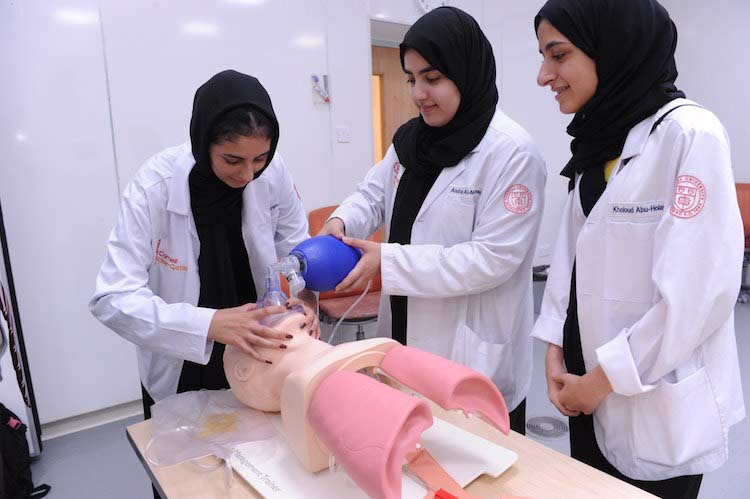First-year medical students at Weill Cornell Medicine-Qatar (WCM-Q) took their first steps towards attaining the core practical skills of a medical doctor as they completed a day of First Responder Training.
Guided by visiting Emergency Medicine professionals from Hamad Medical Corporation (HMC), the students received training in key practical First Responder skills, such as delivering artificial respiration, immobilising a patient, applying dressings, slings and splints, and using artificial external defibrillator (AED) machines.
The Emergency First Responder Course is something of a milestone for WCM-Q first-year medical students as it presents one of the first opportunities for putting into practice the theoretical knowledge they have learned so far.
Learning Stations
 At the Airway Bag Station, Dr Ram Kumar, HMC Emergency Medicine Fellow, used medical mannequins to demonstrate how to open a patients’ airway and keep it open using an instrument called an airway adjunct. They also learned how to use a bag-valve mask (BVM) ventilator and to clear an airway using a portable suction device.
At the Airway Bag Station, Dr Ram Kumar, HMC Emergency Medicine Fellow, used medical mannequins to demonstrate how to open a patients’ airway and keep it open using an instrument called an airway adjunct. They also learned how to use a bag-valve mask (BVM) ventilator and to clear an airway using a portable suction device.
At the Immobilisation Station, Dr Ashwin D Silvia, HMC Associate Consultant in Emergency Medicine, worked with a standardised patient – an actor playing the role of a patient – to train the students to apply a pelvic binder and to safely transfer a patient onto a scoop stretcher for evacuation.
Meanwhile, Dr Omar Al-Baroodi, HMC Emergency Medicine Resident, used standardised patients to show students how to apply splints, bandages and arm slings and to demonstrate the use of a spinal board. Dr Hany Kamel, HMC Associate Consultant in Emergency Medicine, led the Case Scenarios Station, where students brainstormed responses to medical emergencies such as a seizure or a patient going into anaphylactic shock. Dr Zahra Makki, who completed a pre-medical programme at WCM-Q, used her station to show students how to use the AED machine.
Dr Makki, who then went on to graduate from a medical programme in Bahrain, is now a Resident in the Emergency Department at HMC. She said it has been great to return to WCM-Q and to pass on her knowledge. She said that the students were extremely bright and enthusiastic.
Dr Stella Major, WCM-Q’s Associate Professor of Family Medicine in Clinical Medicine and Director of the Clinical Skills and Simulation Lab, said she was impressed with the eagerness of the students to engage and learn from the emergency medicine physicians from HMC.
They value learning new skills, and show appreciation in having access to all the best teaching aids, task trainers, simulators and simulated patients, provided to them through the Clinical Skills and Simulation Lab at WCM-Q. This course provides them with the basic foundations of how to respond safely to medical emergencies outside the hospital setting.’
For more information about the medical programme of WCM-Q, visit their website at qatar-weill.cornell.edu.





